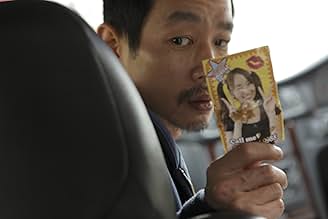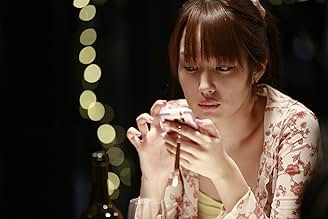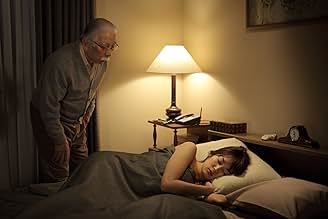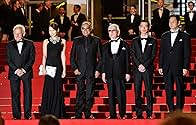In Tokyo, a young sex worker develops an unexpected connection with a widower over a period of two days.In Tokyo, a young sex worker develops an unexpected connection with a widower over a period of two days.In Tokyo, a young sex worker develops an unexpected connection with a widower over a period of two days.
- Director
- Writers
- Stars
- Awards
- 1 win & 6 nominations total
Kôichi Ôhori
- Taxi Driver
- (as Kouichi Ohori)
Ryota Nakanishi
- Student
- (uncredited)
- Director
- Writers
- All cast & crew
- Production, box office & more at IMDbPro
Featured reviews
A vignette of some pretty sad people whose lives intersect in awkward ways over the course of a day. There's an escort/prostitute (Rin Takanashi), who isn't able to see the grandmother who's made a special trip to Tokyo to meet her, because she's going off to meet a client old enough to be her grandfather (Tadashi Okuno). He's a widower who used to teach, and struggles to get her to do the things he planned - drink some wine, eat the food he prepared, and talk - as instead she just wants to go to sleep. Then there's her troubled boyfriend (Ryo Kase), a guy who's in love with her but senses her distance and suspects she's up to something, heightening his jealousy and clinginess. He actually meets the older man the following day and assumes he's her grandfather, resulting in a strained conversation where he gets some advice. Even the nosy neighbor (Mihiko Suzuki) tells of how her love was unrequited and she's now cooped up, caring for her disabled brother.
They're all a bit broken, each in their own way, and yet Kiarostami allows each to engage in thoughtful dialogue that shows their humanity, and that they're not simply objects of pity. It's in those moments that I liked the film the most. I have to say, though, that its quiet style lagged a bit as it played out, and the ending was rather abrupt and unresolved. The quality of the filmmaking was high, and I could really feel myself on the streets of Tokyo at night and in the heads of these people, but the story wasn't particularly compelling to me, so I was left feeling it was a near miss.
They're all a bit broken, each in their own way, and yet Kiarostami allows each to engage in thoughtful dialogue that shows their humanity, and that they're not simply objects of pity. It's in those moments that I liked the film the most. I have to say, though, that its quiet style lagged a bit as it played out, and the ending was rather abrupt and unresolved. The quality of the filmmaking was high, and I could really feel myself on the streets of Tokyo at night and in the heads of these people, but the story wasn't particularly compelling to me, so I was left feeling it was a near miss.
This is a film that from the get-go grabs your interest. It has a unique story, a stylish look and some saddening, emotional moments from it's very beginning that really get you invested in it. A student with a working-class and jealous fiance jilts both him and her concerned family to work secretly as a call girl with her best friend Nagisa. An elderly widower who hires her to talk to him eventually befriends her and becomes more and more involved in her life.
There's so much potential here and as I said, it really hooks you from the get-go in every way. Unfortunately, I felt like I enjoyed parts of this film despite Abbas Kiarostami's direction, rather than because of it. The plot is intriguing (if a bit underdeveloped), the characters and their dynamics are really interesting and the acting is well done all-around. Pretty colours, interesting cinematography too. But jesus, the director really manages to test your patience and turn all of these elements from the genre of dramatic film into the one of tedium and high-level boredom.
I'm sure many would call me uncultured for this, but I really don't see what a five-minute shot of an old man sleeping in his car adds to anything, other than the running time. It's infuriating, because you start to care about the characters and the story and then gradually your thoughts turn to contemplating fast-forwarding or turning the whole damn thing off. Stupid, pointless scenes such as a man realising he's parked on the street so he has to turn his car all the way around. No cutting - of course not - because this director considers himself an 'artisté' and has to show you the entire motion of a guy parking, unparking and driving in a circle in order to park his car someplace else. But hey, maybe it's a metaphor. I'll be sure to call my old English Lit teacher and ask them for the deeper meaning. In the meantime, I was bored to death.
I was going to say that ultimately, the one thing this film did was show me that you can actually enjoy a film even when it frustrates you persistently throughout. But with the way it ends - abruptly, very rushed and without any kind of deep meaning or interesting takes or anything at all, and taking so long to get there - I couldn't even say that.
The most frustrating thing is that if you cut out all the unnecessary chaff, you could have filled the gaps in this film and made it a truly great movie. Develop the main characters a bit more, follow through their quarrels and moral conundrums, give us something to think about instead of pushing ideas into frame and then fading them back out undeveloped, never to be seen again. Unfortunately, this film is instead full of gratuitous scenes only the director himself and armchair cinephiles could really enjoy. A shame, and a real waste from what could have been.
I really wanted to like this one. But I couldn't.
There's so much potential here and as I said, it really hooks you from the get-go in every way. Unfortunately, I felt like I enjoyed parts of this film despite Abbas Kiarostami's direction, rather than because of it. The plot is intriguing (if a bit underdeveloped), the characters and their dynamics are really interesting and the acting is well done all-around. Pretty colours, interesting cinematography too. But jesus, the director really manages to test your patience and turn all of these elements from the genre of dramatic film into the one of tedium and high-level boredom.
I'm sure many would call me uncultured for this, but I really don't see what a five-minute shot of an old man sleeping in his car adds to anything, other than the running time. It's infuriating, because you start to care about the characters and the story and then gradually your thoughts turn to contemplating fast-forwarding or turning the whole damn thing off. Stupid, pointless scenes such as a man realising he's parked on the street so he has to turn his car all the way around. No cutting - of course not - because this director considers himself an 'artisté' and has to show you the entire motion of a guy parking, unparking and driving in a circle in order to park his car someplace else. But hey, maybe it's a metaphor. I'll be sure to call my old English Lit teacher and ask them for the deeper meaning. In the meantime, I was bored to death.
I was going to say that ultimately, the one thing this film did was show me that you can actually enjoy a film even when it frustrates you persistently throughout. But with the way it ends - abruptly, very rushed and without any kind of deep meaning or interesting takes or anything at all, and taking so long to get there - I couldn't even say that.
The most frustrating thing is that if you cut out all the unnecessary chaff, you could have filled the gaps in this film and made it a truly great movie. Develop the main characters a bit more, follow through their quarrels and moral conundrums, give us something to think about instead of pushing ideas into frame and then fading them back out undeveloped, never to be seen again. Unfortunately, this film is instead full of gratuitous scenes only the director himself and armchair cinephiles could really enjoy. A shame, and a real waste from what could have been.
I really wanted to like this one. But I couldn't.
Like Someone in Love (2012) is a Japanese movie written and directed by the great Iranian filmmaker Abbas Kiarostami. Kiarostami brings his quiet, thoughtful style to a culture that is surely very alien to him. Japanese viewers may note cultural errors in the movie. My thought is that Kiarostami can look beyond cultural differences to universal themes.
The movie, set in Tokyo, stars Rin Takanashi as Akiko, a young provincial woman who is a call girl. (She doesn't walk the streets. She works out of a bar, whose owner arranges the sessions at people's homes.) As the movie opens Akiko is facing two immediate problems. Her jealous boyfriend is on the phone, demanding to know where she is. Akiko is a college student, and her boyfriend is aware of that. He doesn't know that she's a prostitute, but he can sense that something isn't right, and he suspects her of cheating.
Akiko's grandmother is visiting Tokyo that day, and desperately wants to see Akiko. Akiko would love to meet with her, but the bar owner is adamant--she must go out on a call to an important client. The client is Professor Takashi Watanabe, played by Tadasi Okuno. Akiko has no choice but to ignore her grandmother and visit the professor's apartment.
Prof. Watanabe is a gentle, lonely widower. He has prepared a special dinner for Akiko, and he's playing Western music. (It's Ella Fitzgerald singing "Like Someone in Love.") It's more like a seduction scene than a paid sexual encounter.
Akiko spends the night at the professor's home, and he drives her to the university the next morning. It's at that point that the film takes a different turn, because Akiko's violent boyfriend confronts her on the university steps.
All of this action takes place in the first third of the movie. In the remainder of the film, Kiarostami continues to explore this unusual and somewhat threatening love triangle. This interaction among three very different individuals provides a fascinating look into human relationships. Where these relationships will lead isn't always obvious or predictable.
I enjoyed this intelligent, thought-provoking movie. It will work well on DVD. It's worth seeking out and watching.
The movie, set in Tokyo, stars Rin Takanashi as Akiko, a young provincial woman who is a call girl. (She doesn't walk the streets. She works out of a bar, whose owner arranges the sessions at people's homes.) As the movie opens Akiko is facing two immediate problems. Her jealous boyfriend is on the phone, demanding to know where she is. Akiko is a college student, and her boyfriend is aware of that. He doesn't know that she's a prostitute, but he can sense that something isn't right, and he suspects her of cheating.
Akiko's grandmother is visiting Tokyo that day, and desperately wants to see Akiko. Akiko would love to meet with her, but the bar owner is adamant--she must go out on a call to an important client. The client is Professor Takashi Watanabe, played by Tadasi Okuno. Akiko has no choice but to ignore her grandmother and visit the professor's apartment.
Prof. Watanabe is a gentle, lonely widower. He has prepared a special dinner for Akiko, and he's playing Western music. (It's Ella Fitzgerald singing "Like Someone in Love.") It's more like a seduction scene than a paid sexual encounter.
Akiko spends the night at the professor's home, and he drives her to the university the next morning. It's at that point that the film takes a different turn, because Akiko's violent boyfriend confronts her on the university steps.
All of this action takes place in the first third of the movie. In the remainder of the film, Kiarostami continues to explore this unusual and somewhat threatening love triangle. This interaction among three very different individuals provides a fascinating look into human relationships. Where these relationships will lead isn't always obvious or predictable.
I enjoyed this intelligent, thought-provoking movie. It will work well on DVD. It's worth seeking out and watching.
"Like Someone in Love" is Abbas Kiarostami's follow-up to the mind- bending relationship drama "Certified Copy". Dissection of the title alone provides so many interesting clues and directions for the film to take in addition to what was analyzed previously. And while it does in fact address those interesting ideas (indirectly), it is as minimal as any film-going audience could possibly stand. We essentially watch an unexplained relationship unfold in almost real-time (just under 24 hours).
Akiko (Rin Takashi) is a college-aged girl up to something in the big city of Tokyo that is probably not good for her. She's having an argument with her boyfriend on the phone and she's saying no to a job that a middle-aged man is offering her. This middle-aged man is clearly her pimp and "no" means "yes, sir, I will do whatever you tell me to." So into the cab Akiko goes and we begin to worry about her safety. We spent an awful long time worrying about her safety with no idea what lies ahead for her. The cab ride was two hours long and we saw a lot of it. Akiko arrives at the apartment of an older gentleman looking for companionship. We don't really know what exactly Takashi Watanabe (Tadashi Okuno) wanted with Akiko, and then in the morning he drives her back to Tokyo. Another long car ride.
Visually the car rides were impeccably shot. The scenery was reflected in the windshield and we could still see the characters' faces behind. Unfortunately we don't really know what's happening with these characters during these long car rides. Sometimes a car ride is just a car ride.
Eventually we meet Noriaki (Ryo Kase), Akiko's offensive boyfriend. And he starts putting the relationships into perspective. A different perspective. He allows Akiko and Watanabe to act differently than they actually are, which allows us to start seeing them as they actually are. And then it ends. Well, not quite that quickly, but without giving anything away, it ends.
We're given so little on screen to examine that it can be frustrating even to the viewers that appreciate the subtle beauty in film. Two weeks after first seeing it, my mind has started to form a few opinions on what was being said but it's still a bit too little, too late.
Akiko (Rin Takashi) is a college-aged girl up to something in the big city of Tokyo that is probably not good for her. She's having an argument with her boyfriend on the phone and she's saying no to a job that a middle-aged man is offering her. This middle-aged man is clearly her pimp and "no" means "yes, sir, I will do whatever you tell me to." So into the cab Akiko goes and we begin to worry about her safety. We spent an awful long time worrying about her safety with no idea what lies ahead for her. The cab ride was two hours long and we saw a lot of it. Akiko arrives at the apartment of an older gentleman looking for companionship. We don't really know what exactly Takashi Watanabe (Tadashi Okuno) wanted with Akiko, and then in the morning he drives her back to Tokyo. Another long car ride.
Visually the car rides were impeccably shot. The scenery was reflected in the windshield and we could still see the characters' faces behind. Unfortunately we don't really know what's happening with these characters during these long car rides. Sometimes a car ride is just a car ride.
Eventually we meet Noriaki (Ryo Kase), Akiko's offensive boyfriend. And he starts putting the relationships into perspective. A different perspective. He allows Akiko and Watanabe to act differently than they actually are, which allows us to start seeing them as they actually are. And then it ends. Well, not quite that quickly, but without giving anything away, it ends.
We're given so little on screen to examine that it can be frustrating even to the viewers that appreciate the subtle beauty in film. Two weeks after first seeing it, my mind has started to form a few opinions on what was being said but it's still a bit too little, too late.
This Movie reminds me a lot of "4 months, 3 weeks and 2 days", in its minimalist approach to story telling. It almost isn't a story in the conventional sense; there isn't a clear build up to some resolve, it's more like just a snapshot of someone at a particularly desperate point in their lives with a quiet but rather brutal pathos.
It also reminded me a bit of Anomalisa with its two slightly lost characters finding each other for comfort though here it's more about emotional support.
Cool and leisurely, a lot of it feels just like chat because that's what people are like. I watched this over about four sittings over a period of a few months because it is a movie that really demands that you slow your pace to match its own, but over all I admire the uncompromising, unpretentious tone where there are no easy solutions offered, just the blunt jab of reality delivered without aggression.
It also reminded me a bit of Anomalisa with its two slightly lost characters finding each other for comfort though here it's more about emotional support.
Cool and leisurely, a lot of it feels just like chat because that's what people are like. I watched this over about four sittings over a period of a few months because it is a movie that really demands that you slow your pace to match its own, but over all I admire the uncompromising, unpretentious tone where there are no easy solutions offered, just the blunt jab of reality delivered without aggression.
Did you know
- TriviaIn the late 1990s Abbas Kiarostami was driving late at night while on a visit to Tokyo and witnessed a young girl on the side of the street dressed as a bride. In the years following, while visiting Tokyo to promote other films, he realized that he was always looking for that same girl because she had left such an impression but that he would never likely notice her again in real life because she wouldn't be wearing the same dress. This experience became the basis for the film.
- ConnectionsFeatured in At the Movies: Cannes Film Festival 2012 (2012)
- How long is Like Someone in Love?Powered by Alexa
Details
- Release date
- Countries of origin
- Official sites
- Language
- Also known as
- The End
- Filming locations
- Shizuoka, Japan(Shizuoka Station)
- Production companies
- See more company credits at IMDbPro
Box office
- Gross US & Canada
- $239,056
- Opening weekend US & Canada
- $21,813
- Feb 17, 2013
- Gross worldwide
- $562,878
- Runtime
- 1h 49m(109 min)
- Color
- Sound mix
- Aspect ratio
- 1.66 : 1
Contribute to this page
Suggest an edit or add missing content





























